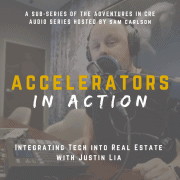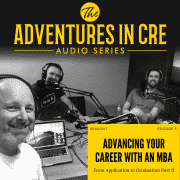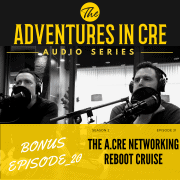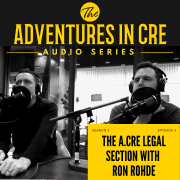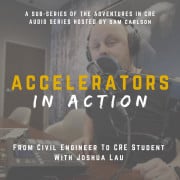Leveling Up as a CRE Entrepreneur With Mark Rios | S3SP1
In this first special episode of the 3rd season of the A.CRE Audio Series, we feature Mark Rios, a real estate entrepreneur with a background in media. In addition to being an A.CRE Accelerator Graduate, he is the principal and co-founder of Prosperity CRE. Growing up in Hollywood, Mark planned for a career in the entertainment industry and spent 30 years in various acting roles. Through the years he eventually fell into commercial real estate and co-founded Prosperity CRE, a private real estate investment firm.
In this episode, we discuss the various aspects of running a CRE business and the steps Mark is taking to further his CRE and business abilities. We highly recommend you check him out in the links provided. To watch, listen, or read Spencer, Michael, and Mark’s conversation on running a real estate business and being a CRE entrepreneur, see below.
Leveling Up as a CRE Entrepreneur With Mark Rios
Or Listen to this Episode
Resources from this Episode
Episode Transcript
Announcer (00:01):
Welcome to the Adventures in CRE audio series, join Michael Belasco and Spencer Burton as they pull back the curtain on everything commercial real estate and introduce you to some of the top minds in the industry. If you want to take your skills to the next level and be part of a growing community of CRE professionals across the world, this is for you.
Spencer Burton (00:25):
Hello, and welcome back to the Adventures in CRE audio series. I’m Spencer Burton. I’m joined here by my co-contributor, Michael Belasco. Sam Carlson’s out today. So you’ll have to excuse him. And we’ve got an exciting topic today. We’re here with guest Mark Rios.
Spencer Burton (00:40):
Mark is a real estate entrepreneur with a background in media. We’ll get into his background in a minute, but he is the principal and co-founder of Prosperity CRE and he’s also a graduate of our real estate financial modeling accelerator program and why we wanted to bring you on, Mark, is we love your background and the way in which you’ve transitioned into real estate and taking it very seriously. And so, we’ll get into that. So maybe first off, thanks, Mark, for joining us.
Mark Rios (01:12):
Thank you. Yeah. Very exciting to be here, actually.
Spencer Burton (01:15):
Good. For the benefit of our audience, maybe give us 30 seconds of background on who you are, where you’ve been, and what you’re currently doing.
Mark Rios (01:25):
Okay, cool. So 30 seconds?
Spencer Burton (01:28):
You can go a little longer.
Mark Rios (01:31):
Listen, I’m a late bloomer in real estate. And I grew up in California, out here in Southern California, Los Angeles specifically. Spent my younger good part of my younger years kicking around in and off the sunset strip. I’m talking when I’m a kid. And I grew up basically in Hollywood and I’m not really a Hollywood insider, but my mother was in the business and so I was all around it a lot. And so it was really natural for me when I was in college to really consider a career in the entertainment industry. Especially when my friends were actors and they were getting girls and things like that.
Mark Rios (02:13):
Why wouldn’t I try to chase girls myself? So actually I got my first agent when I was really young and I’m an on-camera performer, and I’d say at probably 18 years old and for my first years in college, I was kind of doing both and trying to audition and things like that and get started in the acting. And then I actually had some success in acting and decided to go full-time. So I quit college at that point, and we’ll come back to that, and really kind of just spent the last 30 years building out a career in the entertainment industry, trying to navigate that, but also really exploring the personal art of being an actor and learning how to grow up within that kind of sphere and learned a lot about filmmaking. Done tons of TV movies, films, starred in some stuff, been a series regular in some stuff. Been in big movies, small crappy little things, just. I’ve pretty much done it all and it’s really provided me a great life.
Mark Rios (03:15):
I have a pension for it. I still have some ties to the entertainment industry because I have to, in today’s healthcare environment, I have to use my union for health insurance for my family. So that’s totally fine.
Spencer Burton (03:29):
Sure.
Mark Rios (03:30):
But over the years, instead of having to go out and get a bartender job or do what normal actors do, I fell into real estate. And it’s a joke out here nowadays that most actors are realtors out here. It’s one of the easy ways for you to… I wouldn’t say easy ways, but, real estate out here when it’s in an upcycle, it’s very easy for you to throw a rock and make some money. And that being said, because I come from a tradition of really trying to work hard within the theater, in developing my craft, I kind of took the same mentality when I got into real estate and really wanted to learn every single thing that I could within that.
Mark Rios (04:16):
So I got my license back in 2004, I think 2005, something like that as a realtor. Started originating loans, started making some money. I had some deals in the pipe in terms of being a listing agent and the buyer’s representative. There was a certain point right before the crash where I really got sick of representing people on a personal level like that, just between us. I really kind of figured out that I did not like jumping in a car with people and driving them around and kind of handing them their dreams in a way when I had dreams myself. So I did pull back a little bit from that part of it and started concentrating on my investing. Creative investing, seller financing, all this stuff you heard from Ron Legrand back in the day, the marketing portion of it, the subject-to deals, fix and flips, wholesaling.
Mark Rios (05:11):
All of that stuff was stuff that I was really into. Land contracts, all that crazy stuff. And I had some great success after the crash kind of came back and reoriented myself, once things kind of stabilized got back into the business in terms of really working my own personal portfolio of stuff. And then I found commercial through a mentor and the type of real estate that they were doing I wasn’t seeing anywhere else, right? It wasn’t the, “Hey, come to a seminar and learn how to wholesale the trade,” and things like that. It was commercial real estate. It was very kind of investment banking focused. My mentor came from Wall Street. He was at Goldman Sachs and I thought that this was the way to scale up and really build a business out of it. So I dumped all my residential properties and got into commercial and learned commercial loans, learned all about the capital stack on the commercial side, and all of that stuff. And it’s kind of built out from there.
Spencer Burton (06:24):
Yeah. So elaborate a bit more on what you’re doing at Prosperity CRE.
Mark Rios (06:30):
Sure.
Spencer Burton (06:31):
To help our audience understand where you’re at currently and then we can talk about what you’re doing to get to the next step.
Mark Rios (06:38):
So I guess the simplest way to say it is at that Prosperity CRE we’re a small kind of private equity real estate firm, we’re in acquisitions, we’re asset managers. We’re also equity syndicators. So mostly friends and family money, but the friends portion of that really encompasses the types of friends that we can draw into our sphere that are retail investors that are interested in passive income.
Mark Rios (07:05):
We purchase multifamily. We purchase commercial properties, really looking at, we love the industrial space. We love the smaller flex industrial stuff. I’d say we top out at 15 million. Stuff that the institutions aren’t really looking at. And we love niche-y kind of office stuff. So medical office, a few different kind of sub types of properties inside the office asset class. And really what we do is we go out, we find the deal, we put together an investment package. We go out to our network of investors and we present it to them. We try to supply them with really good returns. So our typical thing it’s, these are syndication one-offs. So it’s like a mini fund. We give them a preferred return. We also give them a majority split on whatever profits are above those. And of course we get a promo, we get some asset management fees and things like that to keep the lights on, basically.
Michael Belasco (08:10):
Yeah. Great. And this has been running.. So after the crash, this has been what you’ve been doing and it’s been running continuous since then.
Mark Rios (08:17):
Yeah. So really the timeline was… This is just a side thing, but I do have a commercial mortgage brokerage and that’s really kind of where the cash comes in. So my thinking basically was, I was introducing capital, some big players to sponsors and I realized that I didn’t want to be a broker during a downturn. And this downturn has been hanging over us for 10 years now, and it hasn’t happened yet even through COVID, it really hasn’t happened. And so I was like, well, if I want to take advantage of my contacts, I need to get a track record. I need to do this myself. And so I’d say starting in 2016, I really, from 2012 to 2016, I was really focused on the brokerage side of things, finance. And then from, I’d say, 2016 to now, been really, really focused on acquiring properties, learning capital raising, learning investor relations, and really kind of building a really solid business that now I can see we can grow into the future. Like this is the way to go. So yeah, I’d say from 2016 to now.
Michael Belasco (09:36):
So you look at your background and your trajectory, you really have experienced kind of all over the place. The guy that seems to have learned firsthand a lot, right? You’d look at you and you’d say, okay, this guy knows what he’s doing, where he is. There’s a lot to learn from this guy, right? And here you are now at this part of your career. And yet you feel there’s a need now for you to continue on, on your educational path, which I think is amazing. In fact, some of the most prolific and successful teachers, or not even teachers, people out there actually practicing are the ones that never stopped being a student. And so I’m curious, so maybe you can give a little-
Spencer Burton (10:19):
Yeah, well first a little context, right? So in addition to Mark taking the Accelerator program, Mark is now enrolled in a Masters in real estate program. So to Michael’s point, continuing to learn and to grow.
Michael Belasco (10:33):
I was going to ask Mark. So what are your next steps here? It’s like, you are already doing all this and you’ve grown a business. Sounds like it’s quite successful and so yet you are now continuing on a pestle. What are your next steps and why are you doing this now?
Mark Rios (10:51):
Oh man. Sometimes I do it the hard way, but I think that… Okay, so just going back, one thing that I learned as a very, very young in my earlier career was acting or even art is an excuse to learn everything. And what that meant was basically you never stop learning and you can have an excuse to learn everything, to explore everything and not have to answer to anybody’s kind of looking at you askance, right? And so carrying that forward into this, I’ve always had that, always wanting to improve. And as I grow older, trying to take away some of my stubbornness, I also realize I have blind spots too. And so I think the impetus for really kind of getting and solidifying my formal education was not only to learn from people who know more than me, especially where I want to go.
Mark Rios (11:55):
So I want to build a multi-million dollar business, perhaps even a billion-dollar business, eventually, real estate business, and be with my partners but be a principal in that kind of endeavor, but also where I’m at right now, there’s also the credibility factor. And so having the certification from you guys, from the Accelerator program or REFM, or some of these other certs, that’s all fantastic. It’s all very technical too, right. It’s great to be certified as a real estate modeler, but, and people don’t look down on that at all, but I also feel like credibility-wise, I’m really going to be setting my feet into the ground with a master’s program under my belt. And I’ll have the… It’s not something that I’m going to be able to whip through. I really want to learn. I want to learn this stuff. The stuff that I don’t know about.
Spencer Burton (12:57):
I love that, there’s too many real estate entrepreneurs that are essentially promoters. They’re marketers. That’s what they do and they do it well, but it’s a massive disservice to the limited partners that they partner with because at the end of the day, the limited partner’s not investing based on a marketing pitch. They’re investing based on the competency and the quality of the sponsor, the general partner. And so the fact that you are… That you’ve recognized that, and you’re clearly a great marketer too. Several decades on screen helps out with that.
Spencer Burton (13:43):
You’re developing both. And that’s an unstoppable combination. Well, let me ask you this, as you were looking at… Why a master’s in real estate, right? So there’s, there’s a variety of ways that you could get credibility and you have a fair amount of credibility. Why a master’s in real estate? Why not an MBA? Why not DIY sort of a program? Why a master’s in real estate?
Mark Rios (14:17):
So actually this was a question… I actually use some of your guys’ resources to try to figure this out. And I mentioned this to you earlier, but I actually was accepted to an MBA program at the University of Illinois. And so I had the choice of do I want to do the master’s and get more of a, kind of a deep dive into the workings of real estate? Or do I want to kind of keep it broad-based? Part of my decision-making, really having my bachelor’s is with finance… It’s a business degree with a finance concentration. I got to tell you, man, some of the accounting classes, just really, I was just like, “oh my God.” I know I have to know it, but there is some stuff that I was just like, “God.” So I actually, when I was kind of considering an, I saw a preview of some of the MBA classes that I’d be taking the first year, no knock on it.
Mark Rios (15:13):
But I was like, do I want to spend the next six, eight months really kind of going back into financial accounting and managerial accounting and all of that stuff, or do I want to just do what I… What’s fun to me? And real estate’s fun to me. Real estate is what I want to do. And I’m like, Okay, I’m already a business owner. I know I’m never going to be an analyst. I’ll never have to put my res… So I can do whatever I want. Right. And why don’t I just learn the stuff that I love and the rest of the business stuff, I’ll figure it out, or I’ll take a cert to go… I’ll do a certification for the stuff that I’m missing, but at least I’ll have the… I’ll have a good two years of really digging into the stuff that I just really love, which is, I love the dirt. I love the buildings. I love the people that are involved. Yeah, I’m a little bit of a promoter, but I’m also a technician. Right. And, and so that’s kind of… I think that that’s kind of the main thing. If I were to go out, wanting to go out and get a job, maybe the considerations, it would be a little bit different, but I own a couple businesses. I’m not going to, it’s really just kind of, have a little backup.
Spencer Burton (16:27):
Yeah. I like that. Everyone who goes back to school to get a master’s in real estate or an MBA, they have a reason to have a story. All of us, the three of us on this call all have masters in real estate, or soon to have a masters in real estate. Michael is slightly unique in that he went and got a dual. He did the MBA and a masters in real estate. But Michael, how does your situation differ from Mark’s?
Michael Belasco (16:53):
I think Mark’s exactly right. When you look at his trajectory where he is, he’s a business owner. He’s in a position to where he doesn’t need to go out and get that first job, which is what we talk about so many times. When I was considering going back to school, I was a career switcher. I had no track record. And so for me, I went out and did the dual. I wanted that expertise. And I wanted what a lot of people would say is the gold standard of a business degree, which is the MBA. And so having both of those under my belt was the credentials that I needed from my position to get into where I needed to go to continue on my path.
Mark Rios (17:28):
Right.
Michael Belasco (17:28):
Now, mark, I would agree with you 100%. You’re not where I was. You’re well, on a different path. And even Spencer, when you talk about your trajectory, I mean, you’ve had what you needed in the toolkit, so to speak, in terms of experience and resume. So from my perspective, it was the right decision to do that. But for Mark, yours sounds perfect so it’s exactly what you should be doing. So-
Mark Rios (17:53):
So Spencer, we chatted just a little bit about just kind of Adventures in CRE. And I know it’s not… It’s more than hobby obviously, but you guys actually work at firms, right. Just in terms and are they third-party firms, are you guys principals in it? Are you guys business owners? Or how does that work?
Spencer Burton (18:11):
In my case, I’m a principal. Michael’s more entrepreneurial than I am in what he’s doing. But yeah, Adventures in CRE for us is a passion and extension of this passion for teaching, for real estate, to connecting. I mean, it’s cool, Mark, right? We met through Adventures in CRE, this never would’ve happened had that… But yeah, it’s definitely a passion and I hate to call it a hobby, but it is a hobby in the sense that it’s what I want to do in my spare time.
Michael Belasco (18:40):
Yeah. It’s a hobby that’s taken off. It’s become a business by accident in a lot of ways, just because there’s such a need for it, but for us, yeah. The network to talk to you right now on this and share your story with so many others right now is all… It’s such a fun thing that, yeah, it’s a hobby and you could call it a job, but it’s much more of a hobby and always fun. So,
Mark Rios (19:05):
And so in terms of your guys’s firms that you’re involved with… For you, Michael, the MBA, is there a portion that you can say, “Oh yeah. You know, I’m really glad I have the MBA.”
Michael Belasco (19:16):
No.
Mark Rios (19:16):
Does it really come up, like Elon Musk really kind of poo-pooing get out from the spreadsheets and get on the factory floor. And I love that so much, right? Because I’m such a spreadsheet guy that… And not to take away from your answers so I won’t go to long,
Michael Belasco (19:33):
No, you’re okay.
Mark Rios (19:33):
But no, getting out and walking the properties that we’re buying or doing due diligence and all that stuff. And also keeping in mind that the people that live inside our buildings are actual people informs my spreadsheets 100%.
Michael Belasco (19:50):
Big time.
Mark Rios (19:51):
So crucial.
Michael Belasco (19:52):
Big time. So-
Mark Rios (19:54):
Yeah. Elon Musk’s trajectory is different than mine too. When you look at where Elon Musk came from, his story. He was flying planes all around Africa, there’s family. Well, I mean, he’s got a different trajectory too, for me, he’s a one in a million person. Right. I agree with that sentiment, but I needed the connectivity, the other piece that the MBA brings is… And the master in real estate, as well as that network. So for me to go back in and connect through that, where I was coming from at my age, my time when I started newly discovering commercial real estate, as a passion at that time, it was like being shot out of a shot-
Mark Rios (20:41):
It was like a shortcut in a lot of ways to just get to where I needed to get faster, coming out of the MBA and master in real estate. I ended up going to Heinz, which is one of the greatest shops out there. So I don’t know that I would’ve gotten that… I may have with just the master in real estate, but the master in real estate plus my background prior to getting into school, in my opinion, would have been a hindrance. It gave me three years. I went and did every internship I could under the sun. I mean, I was out there just building my resume with every free minute that I had. So yeah, to me, it’s everybody’s pathway and everybody’s there. I get the MBA. Do I use the tools from the MBA program?
Mark Rios (21:20):
Somewhat. Could I have gotten it from a book and moved on and kept going? Probably. But you know what, the MBA stamp. We talk to companies and they’re hiring people. It’s like, if you get into the MBA, that’s like a stamp of approval to get into a good one. That’s like a stamp for them to say, take a serious look at you. And I know that it’s unfortunate, but that’s the truth and that’s the reality of the world we live in. So I jumped at both and I paid for it. I didn’t have any scholarships or anything like that. I just went and bit the bullet. I’m glad I did, quite honestly, but I’ll never need it again at this point. You know what I mean? It’s like, it’s just that one. You need it for that one step. And then you get in and it shortcuts you.
Mark Rios (22:03):
The grass is always greener on the other side. So the grass is always green on the other side. But I got to tell you, just hearing your story and knowing what young folks are doing out there to try to get internships and the denials and the rejection. And I know I sound weird because I’m an actor, but I’m going to tell you, I’m so glad I did acting and I’m not out in that cutthroat… I’m really thinking, man. I’m like, “Oh my God. I’m glad I have the choices that I have now and have dealt with. I had some refuge in the theater, right? But the rejection wasn’t just straight up, “No.” It was just you don’t get the job so you move on.
Michael Belasco (22:44):
Yeah. You know, it’s interesting. When I got into school, the MBA orientation, they basically told… They said this straight up, they said, “There’s, there’s so many applicants, everyone that’s sitting in this auditorium right now, we could replace you with other applicants that applied, that got rejected and it wouldn’t make any difference.” It was kind of the message. It’s like you got in. And it’s like, basically the selection process is so hard. And everybody’s so right there that it’s almost, I don’t want to say it’s luck, but it is, they just have so many choices to make it right. You’re just subject to this process by which-
Mark Rios (23:24):
Look at these cheeks in acting, how are you going to get, how are you going to replace these cheeks?
Michael Belasco (23:32):
You can’t, I’m looking at it now anyway, on the outside of real estate for anybody listening, go to IMDB and check out Mark’s stuff. He’s got a lot going on there. So he’s got two prolific careers happening here. So…
Spencer Burton (23:48):
Well, I do think the broader point when you talk about the MBA and not to diminish the MBA at all, and I totally agree with Michael, it was the right move for him. If you notice, though, Michael did the dual and the world of a business generalist is over. You have to specialize. You have to have a skill, a technical skill that sets you apart because everyone’s a business generalist these days. And so Michael specialized by pairing the MBA with his master’s in real estate.
Spencer Burton (24:25):
And what we’re seeing is the top MBA programs, with a few exceptions, now have concentrations and you arrive on campus and the first things you need to do is choose a path and your networking efforts and your technical training. All those honed in around some concentration and to where you’re going, Mark, it’s essentially the same thing. It’s you want to be the best in the room at this skill, the real estate skill. And it’s more… I totally agree with it’s more than just the technical piece. There’s a lot to real estate and the Accelerator teaches you real estate financial modeling, but that’s one dimension of a multi-dimensioned business. And so I… Celebrate that you’re going and getting the master’s real estate. I think that’s really cool.
Spencer Burton (25:23):
Michael, any parting words? I think we’re running low on time. Anything that you’d add, or Mark add as we wrap up here.
Michael Belasco (25:31):
Yeah. I’m just really excited to follow up with Mark. It was great to hear his story. He’s got so much more to his story, by the way that we didn’t even get to touch on. Maybe we could do a follow-up with him at some point, maybe when you graduate on the back end. That’d be awesome.
Mark Rios (25:46):
Yeah. That would be actually… That would be amazing. Cause I’m sure I’ll have gray hair and I’ll probably have a beard and all kinds of crazy stuff. So… I’ll have transformed into something else.
Spencer Burton (26:02):
If Mark you’re okay with it, we’ll include a link to Mark’s company’s website in the description below. If you’re out there and you’re looking for a great sponsor GP to connect with, he may have opportunities coming down the pike. Maybe not depending, I’m sure you don’t have any trouble raising capital, but anyway, well connect with Mark if you can, and yeah, again, thank you for your time and to our listeners, thank you for spending the time with us and best of luck in your adventure in portfolios.
Announcer (26:38):
Thanks for tuning in to this episode of the Adventures in CRE audio series. For show notes and additional resources, head over to www.adventuresincre.com/audio series. Would you like to learn real estate financial modeling in a matter of weeks and do it with zero guesswork? If so, the A-CRE Accelerator is for you. The Accelerator is a step-by-step case-based program designed to teach you exactly what you need to know. And in the order you need to know it so you can gain both the knowledge and experience to take your career to the next level. To see if the Accelerator is right for you go to www.adventuresincre.com/accelerator.
Frequently Asked Questions about Leveling Up as a CRE Entrepreneur With Mark Rios

